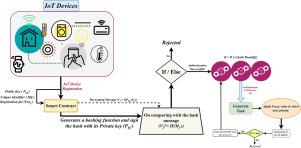使用增强的模糊爬行动物搜索算法为物联网网络提供安全高效的区块链任务分配
IF 7.6
3区 计算机科学
Q1 COMPUTER SCIENCE, INFORMATION SYSTEMS
引用次数: 0
摘要
物联网(Internet of Things, IoT)网络正在快速扩展,物联网设备、传感器、节点和网关之间的认证和任务分配挑战非常复杂。传统的身份验证方案和任务分配方法通常需要提高可扩展性,以解决物联网设备固有的资源限制。本文提出了一种基于区块链的框架,用于物联网网络中安全高效的任务分配,该框架采用增强型模糊爬行动物搜索算法(EFRSA - TA)。提出的框架使用区块链技术通过智能合约和区块链加密数字签名(BCDS)对物联网设备进行身份验证,确保任务分配的安全性和完整性。通过区块链认证后,任务通过EFRSA−TA分配到设备和传感器上,根据资源可用性、设备位置和任务优先级进行优化分配。EFRSA−TA分为两个阶段。首先,利用模糊逻辑对任务优先级进行分类,提高调度的适应性和响应性。在第二阶段,使用增强型模糊爬行动物搜索算法(EFRSA)和新的验证函数来卸载超出设备处理能力和当前工作负载的任务。区块链加密数字签名(BCDS)与现有的ECC, HMAC, KCDH, LAKA和JWT算法进行比较,以评估框架的有效性。另一方面,EFRSA - TA与几种最先进的优化算法进行了比较。仿真结果表明,BCDS和EFRSA-TA算法在认证时间、误接受率(FAR)、正常运行时间(Uptime &;错误率、区块链开销、框架可扩展性分析、任务分配率、吞吐量、能耗、CPU利用率等,验证了其在IoT网络认证和优化任务分配方面的优势。本文章由计算机程序翻译,如有差异,请以英文原文为准。

Blockchain-enabled secure and efficient task allocation for IoT networks using enhanced fuzzy reptile search algorithm
The Internet of Things(IoT) network is rapidly expanding, and the authentication and task allocation challenges between IoT devices, sensors, nodes, and gateways are highly complex. Traditional authentication schemes and task allocation methods frequently require increased scalability to address the resource constraints inherent in IoT devices. This paper presents a blockchain-based framework for secure and efficient task allocation in IoT networks that employs the Enhanced Fuzzy Reptile Search Algorithm (EFRSATA). The proposed framework uses Blockchain Technology to authenticate IoT devices via Smart contracts and Blockchain cryptography digital signatures (BCDS), ensuring task allocation security and integrity. Once authenticated via blockchain, tasks are distributed to devices and sensors using EFRSATA, which optimizes distribution based on resource availability, device location, and task priority. EFRSATA operates in two phases. First, it uses fuzzy logic to categorize task priorities, improving scheduling adaptability and responsiveness. In the second phase, an Enhanced Fuzzy Reptile Search Algorithm (EFRSA) and a novel validation function are used to offload tasks that exceed a device’s processing power and current workload. Blockchain Cryptography Digital Signature (BCDS) is compared to the existing ECC, HMAC, KCDH, LAKA and JWT algorithms to assess the framework’s effectiveness. On the other hand, EFRSATA is compared with several state-of-the-art optimization algorithms. Simulation results show that BCDS and EFRSA-TA significantly outperform these algorithms regarding Authentication time, false acceptance rate (FAR), Uptime & error rate, blockchain overhead, framework scalability analysis, task allocation rate, throughput, energy consumption, and CPU utilization, confirming its superiority in authentication and optimizing task allocation within IoT networks.
求助全文
通过发布文献求助,成功后即可免费获取论文全文。
去求助
来源期刊

Internet of Things
Multiple-
CiteScore
3.60
自引率
5.10%
发文量
115
审稿时长
37 days
期刊介绍:
Internet of Things; Engineering Cyber Physical Human Systems is a comprehensive journal encouraging cross collaboration between researchers, engineers and practitioners in the field of IoT & Cyber Physical Human Systems. The journal offers a unique platform to exchange scientific information on the entire breadth of technology, science, and societal applications of the IoT.
The journal will place a high priority on timely publication, and provide a home for high quality.
Furthermore, IOT is interested in publishing topical Special Issues on any aspect of IOT.
 求助内容:
求助内容: 应助结果提醒方式:
应助结果提醒方式:


